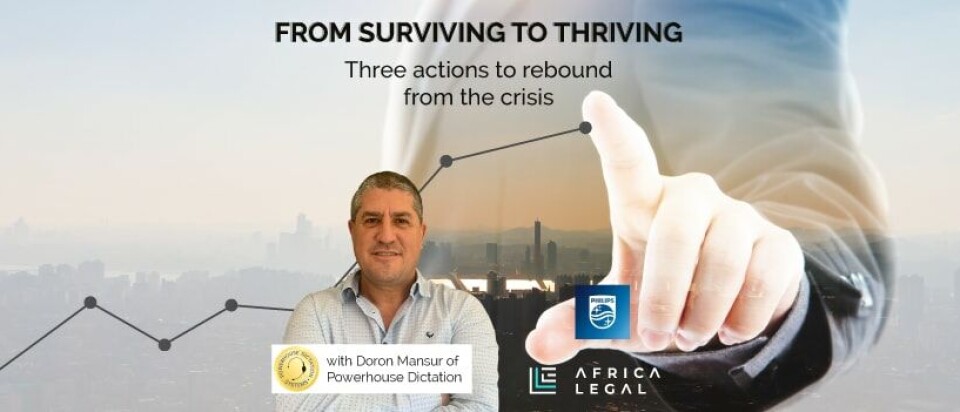Copyright : Re-publication of this article is authorised only in the following circumstances; the writer and Africa Legal are both recognised as the author and the website address www.africa-legal.com and original article link are back linked. Re-publication without both must be preauthorised by contacting editor@africa-legal.com
From Surviving to Thriving

The coronavirus pandemic has changed the way we work and communicate, underscoring the need for businesses to embrace technology and accelerate their digital transformation plans.
Legal professionals now need to work seamlessly from any location. That can potentially be a problem if lawyers need to remain fully connected to and supported by the business.
“Working remotely has presented new challenges for many legal professionals who do not have the services of their support staff readily available,” says Doron Mansur, director of Powerhouse Dictation. “By using our Philips dictation and speech recognition products, lawyers can become more productive and efficient, especially in these uncertain times.”
Take admin and record-keeping work. They are time-consuming tasks and can distract lawyers from client-facing work. Speech technology can help solve this by automating document creation and delegating back-office work through digital dictation. Using Philips’ secure workflow system means lawyers can dictate what tasks need completing remotely and then monitor progress. That frees up lawyers to spend more time and effort focusing on their clients and the high-value work that matters.
Admin support teams can also benefit from using voice integrated systems, such as digital dictation and transcription flows, by giving them a centralised view of all tasks that need attention—a kind of digital in-tray—that is accessible via desktop or mobile. Regardless of their location, admin teams gain full visibility of the volume and types of incoming work—from letters and reports to notes or billing statements—and then allocate tasks among support staff accordingly. This can help speed up communication between lawyers and back-office workers, while also improving accuracy.
All of this means that team members can collaborate effectively no matter where they are located. It also enables lawyers and support staff to work more flexibly—there is no need to keep traditional office hours, lawyers can delegate work using digital dictation, confident that those tasks will be picked up by their admin teams. That allows for seamless communication even if people are working at different hours of the day, removing the need for manual processes or handoffs that can frequently result in bottlenecks.
To learn more about how Powerhouse Dictation and Philips Speech Processing can help your firm adapt and thrive to the new remote working environment, download the guide here
To join Africa Legal's mailing list please click here
